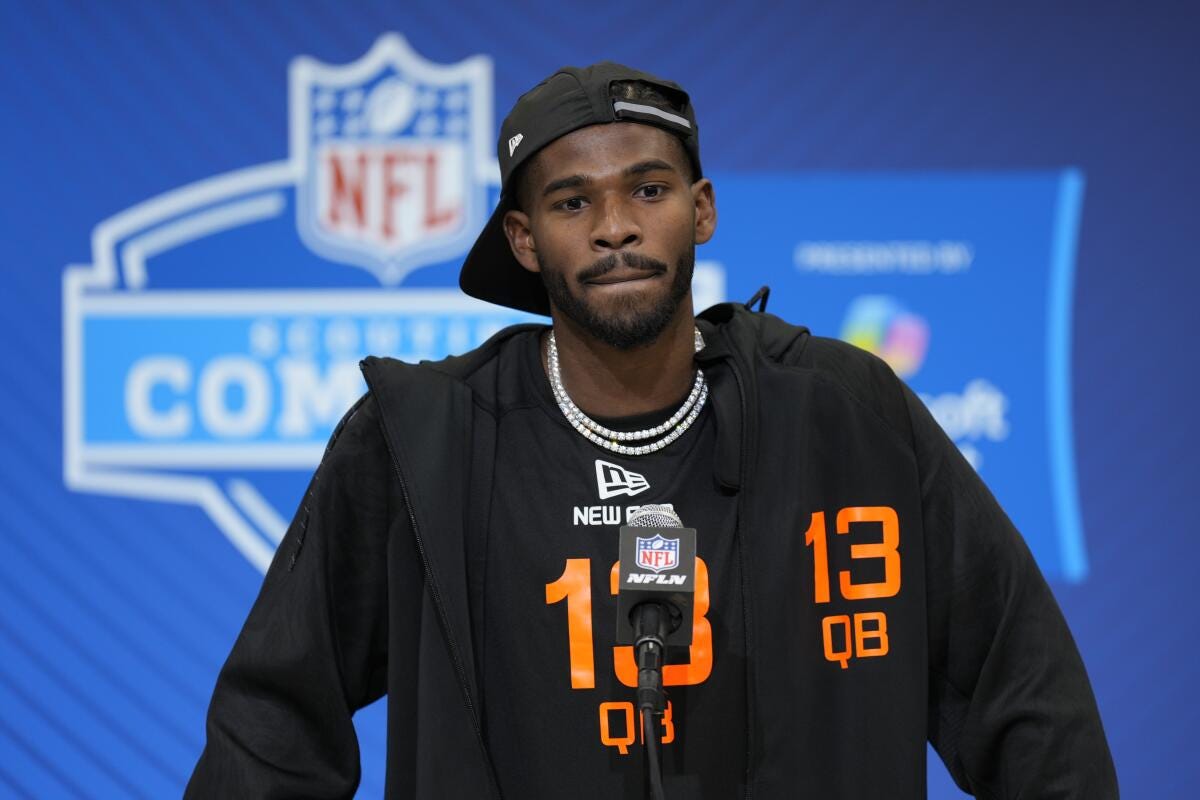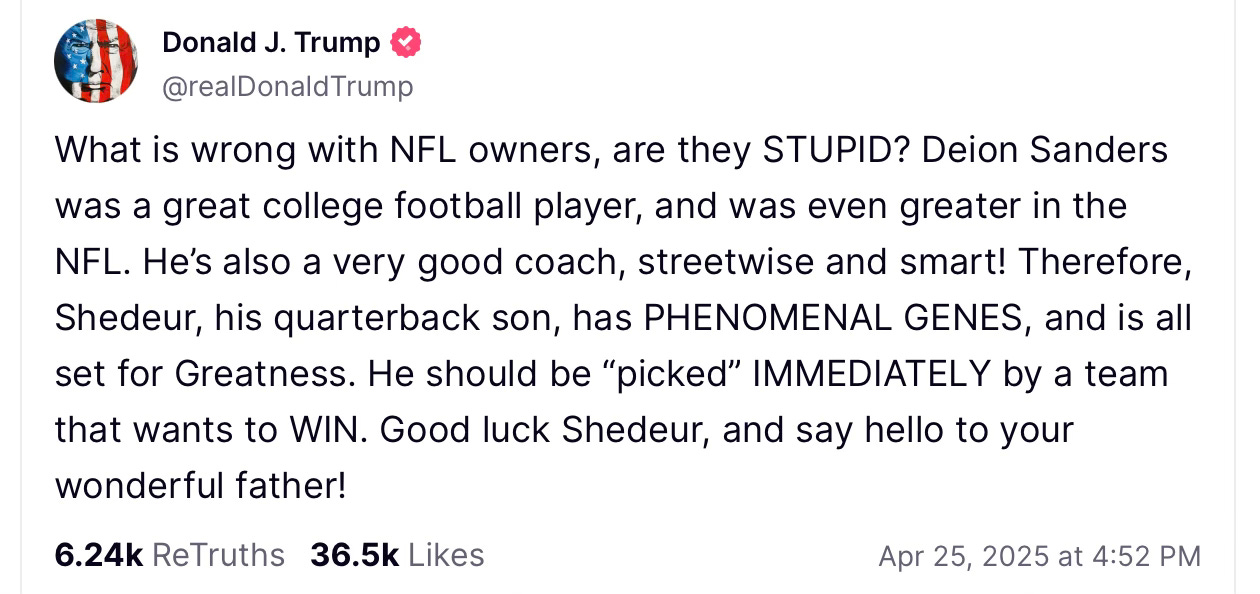From Virtuous to Vicious: Self-Fulfilling Dynamics During the NFL Draft
Exploring the anatomy of a hype bubble
On the first night of the NFL Draft, the entire sports world sat enraptured as Colorado State star quarterback Shedeur Sanders – the son of NFL legend Deion Sanders – was passed over repeatedly as team after team opted for other athletes. At the end of the night, he still had not been picked; he was also passed over during the second and third rounds. It wasn’t until the final day of the draft that he was finally chosen, in the fifth round, the 144th overall pick. Projected to be one of the top prospects at the top position in the sport, it is perhaps the most spectacular drop in the history of the NFL draft.
As one who has studied and written about financial bubbles, I was fascinated by the way this all played out. While the sports world scratched its collective head and apoplectic sports analysts lost their minds, blaming everything from stupidity to collusion to racism, I concluded the Shedeur Sanders hype was a bubble, and on draft night, it popped.
The Shedeur Sanders hype was a bubble, and on draft night, it popped.
My 2011 book, BOOMBUSTOLOGY: Spotting Financial Bubbles Before They Burst, suggested using multiple lenses to analyze a situation might reveal bubbly dynamics in action. And in fact, applying some of these lenses to the Sanders situation suggest the bubble analogy holds.
One of the hallmarks of almost all bubbles is a self-fulfilling dynamic that ultimately proves unsustainable. What does that mean in plain English? Well, if higher prices lead to more demand which leads to higher prices, either the item of value will approach infinite value, or it’s a bubble about to burst. Well, did Sanders have any self-fulfilling dynamics?

Prior to the draft, speculation about Sanders dominated the news. To say that his father is a high-profile figure would be putting it mildly. Deion Sanders long ago mastered the art of commanding the spotlight and managing the media circus. Colorado State - where the elder Sanders is the football coach – isn’t considered one of the top football schools in the country. The celebrity of Deion Sanders brought a lot of attention to the school, and to his son. Each news story upped the ante; coverage begot coverage, hype begot hype. He was increasingly ranked as one of the best players in the draft. Top ESPN analyst Mel Kiper, Jr. not only had him ranked as the fifth best player overall, he even had him as the top QB prospect, ahead of Cam Ward – who was actually chosen first.
This was classic herd behavior. The reporters and analysts were in an echo chamber, only talking to themselves and feeding off one another. It was a bubble, inflating Sanders’ stock well beyond what its eventual value ended up being. The hype drove his “price” so high that no one was willing to pay it. He wasn’t worth a number one or top five pick. And then when the market saw others not paying that price, they decided they didn’t want to risk a top ten pick, or top 20, and so on. What did the others know that they didn’t?
That first night, Cam Ward was the first one off the board. Picks were announced in quick succession; Sanders didn’t go in the top five, nor in the top ten. Teams that needed quarterbacks were opting to draft for other positions. You could feel the tension building; Sanders not being picked was becoming the story and it generated increasingly heated discussion amongst the panels of reporters and analysts covering the event.
A pivotal moment came at the 21st pick when the quarterback-needy Pittsburg Steelers passed on Sanders to draft a defensive tackle. The tension hit a fevered pitch. There were only eleven more first round picks left that night; could it really be that Sanders wouldn’t be picked in the first round?

Then it was announced that the New York Giants, just as desperate as the Steelers for a quarterback, traded up to get the 25th pick. Everyone held their breath; surely this was it. The team had long been speculated as one of the top landing spots for Sanders but had already passed on Sanders once when they took a defensive end with the third pick. It would make sense for them to now move up in the draft and take the quarterback they so desperately needed. But the Giants did not select Sanders; worse, they selected a different QB instead. That was the moment the virtuous cycle turned vicious.
Pandemonium broke out. The analysts were apoplectic. Kiper melted down, tearing apart the NFL as a whole. Even President Donald Trump weighed in. Sanders was in freefall. Pick after pick was announced and his name wasn’t called. The first round ended, then the second, then the third, then the fourth. With each pick, teams began to assume there must be a reason for this drop, wondering, “What do they know that we don’t?”
As everyone tried to understand what was happening, it was clear to me that no one was picking Sanders because…well, no one was picking Sanders. Just as hype begot hype – kicking off a “buying” frenzy that inflated the bubble – now panic begot panic, and a “selling” frenzy grabbed hold of the “market”. It was a social contagion, tearing through NFL draft rooms. Lesser known, less able quarterbacks started being drafted, and even teams that had him on their draft boards started removing him.
Just as during a stock market crash, sooner or later the floor is hit when someone realizes that they can make money at the price being asked. And so it was with Shedeur Sanders, who was eventually selected by the Cleveland Browns, on the third day, in the fifth round, with pick 144. Not only wasn’t he the first QB picked in the draft, he wasn’t even the first QB picked by the Browns.
Just as he was the biggest story heading into the draft, Sanders is now the biggest story coming out of the draft, although for all the wrong reasons. Even now, a week later, it is still dominating coverage of not only the draft, but of the NFL itself. Wild conspiracies abound, trying to find an explanation for what happened. But the truth is that regardless of intrinsic value, in the end all anything is worth is what people are willing to pay for it, and that is deeply influenced by crowd psychology.
And in the case of Shedeur Sanders, that was pick number 144.
VIKRAM MANSHARAMANI is an entrepreneur, consultant, scholar, neighbor, husband, father, volunteer, and professional generalist who thinks in multiple-dimensions and looks beyond the short-term. Self-taught to think around corners and connect original dots, he spends his time speaking with global leaders in business, government, academia, and journalism. He’s currently the Chairman and CEO of Goodwell Foods, a manufacturer of private label frozen pizza. LinkedIn has twice listed him as its #1 Top Voice in Money & Finance, and Worth profiled him as one of the 100 Most Powerful People in Global Finance. Vikram earned a PhD From MIT, has taught at Yale and Harvard, and is the author of three books, The Making of a Generalist: An Independent Thinker Finds Unconventional Success in an Uncertain World, Think for Yourself: Restoring Common Sense in an Age of Experts and Artificial Intelligence and Boombustology: Spotting Financial Bubbles Before They Burst. Vikram lives in Lincoln, New Hampshire with his wife and two children, where they can usually be found hiking or skiing.






